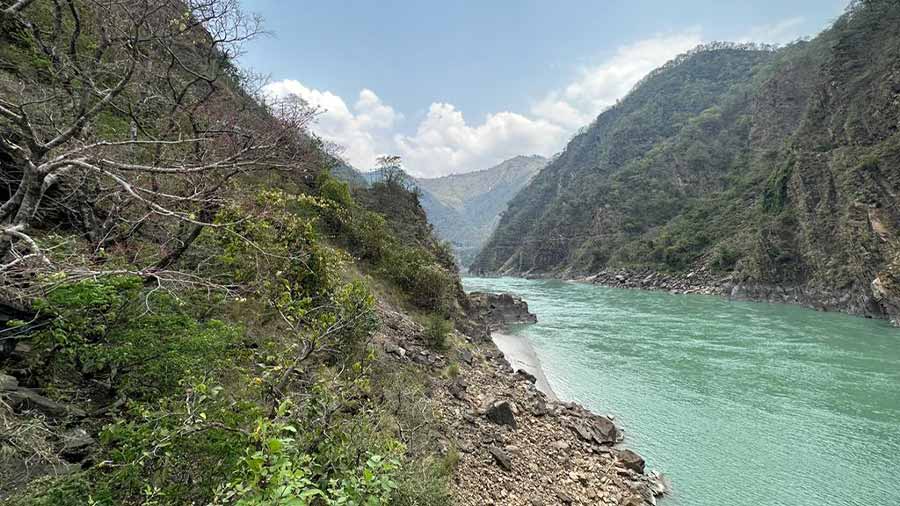The simple pleasure of a hot pub meal and a cold pint can be found just down the street for most people in Britain.
Then, there is The Old Forge: perhaps the most remote pub on the mainland, lying at the end of a multi-day wilderness hike through craggy mountains and glistening lochs.
Isolation is part of the charm that draws adventurers to the untamed landscapes and quieter lifestyle of Knoydart, a rugged peninsula on the west coast of Scotland. To get to its main settlement, Inverie — home to half of the peninsula’s 120 or so residents — travellers must churn over the waters of Loch Nevis from Mallaig or walk some 32km from the nearest road.
In Knoydart, there are no roads connected to other towns, no major supermarket, and in some places, even no cellphone signal. But there is, of course, a pub.
“You definitely need a pub at the end of that big trip,” said Stephanie Harris, business development manager at The Old Forge. “We try our best to make sure that folks have a good welcome when they get here.”
The trek is rewarding, but not without danger. One hiker, Paul Conway, spent nearly a week outdoors this month, according to Police Scotland, after he got lost and went missing on the 39km walk from Glenfinnan to Inverie, one of two main hikes into the village. Conway, 67, was eventually found in “good health and good spirits” after a challenging search that pulled in mountain rescuers, the police said.
In a Facebook post, the pub said it was relieved to hear Conway had been reunited with his family. “We hope to see you in the Forge afore long,” it said.
The Old Forge, once an 18th-century cottage on the peninsula, has long served as a meeting place for Knoydart’s residents and thirsty hikers. In 2022, a group of residents raised more than one million British pounds (about $1.3 million in 2022) to buy the pub and refurbish it.
“Being the only pub in the area, it’s a real focal point,” Harris said of The Old Forge, describing it as an economic and social centre for Knoydart. The previous owner had closed the pub during winters, and that had dampened morale in the village, she said.
These days, the pub is open year-round, and most days a crew of hikers stop by for food or a pint of locally brewed beer.
“So far, it is looking like a really successful year,” Harris said. (For a time, they offered beer for free to hikers as part of a collaboration with an online sports retailer. That offer is no longer valid, she clarified.)
To reach The Old Forge, hikers trek between two deep sea lochs, Loch Nevis and Loch Hourn — popularly translated from Gaelic as “Heaven” and “Hell” — into a lush limbo of steep hills, mountain passes, woodland and valleys. Ravens and eagles circle above, while deer and highland cows roam through the grassland.
“It is the mystery of what is on the other side,” said Ben Thorburn, a spokesman for Wilderness Scotland, which leads guided hikes through Knoydart, of the walk’s appeal. “It’s almost like you’re entering a wonderland.”
But there is very little cellphone signal along the route, which includes some challenging sections, said Finlay Greig, a ranger in Knoydart.
“People have it in their heads that it is a pleasant stroll to the pub, but seriously, it is rough country,” he said, adding that hikers should carry a personal locator device on the journey. Those not up for the long route to the pub can visit via ferries and boats, which also bring supplies from the mainland, he said.
Greig, 31, moved to the peninsula after a hiking trip three years ago turned into a longer stay, and eventually a permanent relocation from Glasgow. “It was the landscape that attracted me, but it was the people and the hardworking community that made me stay,” he said.
He sometimes misses the conveniences of city life, he said, like easily getting a haircut. “You need to be more practical and a little more organised — a little more self-sufficient,” he said.
“You definitely have to have a certain hardiness to live here,” said Harris. But those that choose to make Knoydart their home share a desire to be close to the land, she said. There is a common saying on the peninsula, she said: “If you make it through two winters, you probably will never leave.”
In April, Ruth Aisling, who makes travel videos, made the trek to Inverie. She left her vehicle in Kinloch Hearn, a town from which the hike to Inverie takes two days, and stayed overnight at a bothy, or a shelter for hikers maintained by a national charity.
“It really does feel like a wilderness, because there are no roads,” she said. “You can go long stretches without meeting anyone.”
She, like many others before her, was excited when the village, and then The Old Forge, came into view at the end of the long walk. She went in and ordered a drink.
“It was the best beer I’ve ever had,” she said.
New York Times News Service











